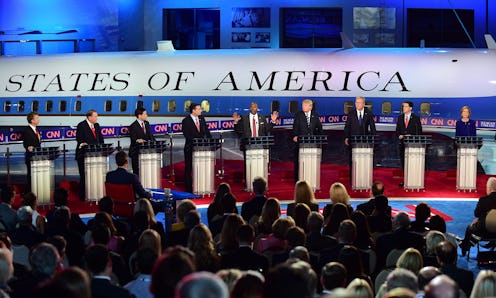The third Republican debate, which will air on CNBC at 8:00 p.m. Eastern time on Wednesday, will focus on the economy, and you can bet there will be plenty of criticism of President Obama. The 2016 Republican presidential hopefuls have never exactly been shy about criticizing Obama's policies in the past, whether their criticisms were justified or not. But no president is perfect, and there are certain problems with Obama's economic policy the GOP candidates would be right to criticize.
This week's debate also coincides with a tentative budget deal between the Obama administration and Congress, which the House could vote on as early as Wednesday. The agreement would allow to U.S. to avoid an impending default next month, since the U.S. Treasury Department believes America could hit its debt ceiling by Nov. 3. The bill would increase military and domestic spending, and to make up for the spending increases, there would be changes to doctors' Medicare payments and the Social Security disability payments system.
The bill, while bipartisan, would increase U.S. spending by $80 billion over a two-year period, so House Republicans may be hesitant to support it. The budget deal will, no doubt, be a part of Wednesday's discussion, but there are plenty of economic initiatives the Obama administration has taken in the past that the candidates would be right to criticize, too.
1. The U.S. Has A "Hidden Unemployment" Problem
While jobs reports numbers may make you believe that America's unemployment rates are somewhat normal — we're no longer in a recession — there's also the factor of involuntary part-time workers. Some experts have described this phenomenon as "hidden unemployment" — U.S. workers want more hours and benefits, but they aren't getting them at their part-time jobs.
And while this problem started before Obama took office, it's still prevalent in the United States today. This past May, for example, New Jersey Gov. and Republican presidential hopeful Chris Christie called out the "huge shift from full-time work to part-time work" in America. Christie blamed Obama's economic policies for the trend, so it wouldn't be surprising if he brought up the problem of involuntary part-time workers at Wednesday's debate, too.
2. The Middle Class Is Still Struggling
Obama has consistently presented himself as a defender of the middle class — part of his presidential campaign strategy was emphasizing that he'd raise taxes on the wealthy. But the U.S. middle class still suffers from the burden of income inequality, and it's something Vermont Sen. and 2016 Democratic presidential hopeful Bernie Sanders is capitalizing on in his own campaign.
In 2013, Forbes' Peter Ferrara wrote that because of Obama's economic policies, the U.S. middle class has lost a month's worth of pay each year. Ferrara explained that median income for middle class families became lower after the end of the recession in 2009 than it was before the recession began.
3. The U.S. Poverty Level Has Increased
During Obama's time as president, the U.S. poverty rate reached 16.1 percent in 2012. In 2007, before the Great Recession took place, the U.S. poverty rate was only 12.5 percent. Millions more Americans receive food stamps than before Obama took office. And while Obama shouldn't be held as single-handedly responsible for poverty in the United States, you can bet that conservatives will ding him for handing out "free stuff."
The GOP candidates will likely use these statistics as examples of their arguments about welfare and government assistance. Jeb Bush, for example, has said that government assistance programs trap the poor and keep them from getting better jobs. In a February speech, Bush said that the Obama administration's economic policies are "recklessly degrading the value of work, the incentive to work, and the rewards of work."
4. The National Debt Has Increased By Trillions
In January, The Washington Post's Philip Bump reported that U.S. national debt has increased by $7.4 trillion since Obama took office as president. Bump explains that the trend of debt increase started before Obama's presidency, at the end of former president George W. Bush's term. But both debt held by the public and by intragovernmental debt increased significantly under Obama. And while Republican presidents like Ronald Reagan and George W. Bush also increased the nation's debt during their presidencies, the GOP candidates will likely focus on the fact that Obama didn't decrease America's national debt.
